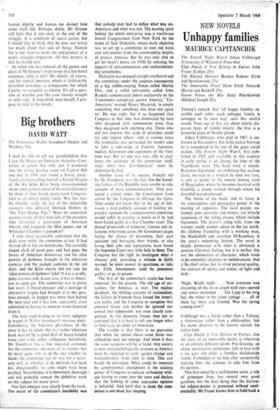Big brothers
DAVID WATT
Warburg 50s)
I shall be able to tell my grandchildren that I saw the House un-American Activities Com- mittee in action—but only just. I wandered into the wrong hearing room on Capitol Hill one day in 1966 and found a bored, pasty- faced salesman calling himself a Grand Dragon_ of the Ku Klux Klan being cross-examined. about some pathetic piece of financial chicanery by three or four bored, pasty-faced Congress- men in an almost empty room. Was this two- bit chiseller really the last of the ineluctable avengers who defeated Sherlock Holmes in The Five Orange Pips'? Were his somnolent accusers really all that were left of the monsters who terrorised a generation of American liberals and conjured the Hiss papers out of. Whittaker Chambers's pumpkin?
I stole away reasonably convinced that the skids were under the committee at last. It had thrived all its life on melodrama. The carefully staged clash of good guys and bad guys, the forces of American democracy and the alien powers of darkness brought in the television cameras and the packed audience in the old days, and the Klan clearly did not rate the 'alien powers of darkness' label. It was a scruffy, puny creature and, in any case, it was as Ameri- can as apple pie. The committee was in pretty low water if liberal pressure and a shortage of alternative targets had brought it to this pass. Sure enough, its budget was more than halved the next year and it has now, apparently, even submitted to having its precious name femoved from it.
The long road leading to its latest indignity is traced in Walter Goodman's massive study. Considering the hilarious ghastliness of the story it has to relate, this is a rather laborious book marred by a good deal of heavy-handed irony and some rather ambiguous moralising. Mr Goodman has a fine impartial contempt for the committee and most of its victims, but he never quite tells us itr the end whether he thinks the committee was or was not a neces- sary evil, or whether, if its methods had been less objectionable, its aims might have been justified. Nevertheless, it is immensely thorough and will probably remain the definitive work on this subject for many years.
One fact emerges very clearly from the book. The secret of the committee's. durability was that nobody ever had to define what was un- American and what was not. The moving spirit behind the whole enterprise was a vociferous Jewish Congressman from New York by the name of Sam Dickstein, whose main objective was to set up a committee to root out nazis and anti-semites from the commanding heights of prewar America. But he was only able to get his heart's desire (in 1938) by enlisting the support of anti-communists and undiscriminat- ing xenophobes.
Dickstein was dumped straight overboard and the committee, under the auspices successively of a big rabble-rousing Texan called Martin Dies, and a rabid anti-semite called John Rankin, concentrated almost exclusively on the 'Communist conspiracy against America.' Un- American,' warned Maury Maverick, 'is simply something that somebody else does not agree to.' He was right, but it so happened that Congress at that time was dominated by men who disagreed with communism more than they disagreed with anything else. Those who did not endorse this scale of priorities could try and impose others—and at various times the committee was persuaded for form's sake to take a side-swipe at Fascists, Japanese, nudists, Klansmen and opponents of the Viet- nam war. But no one was ever able to chal- lenge the existence of the committee itself, since what was 'Un-American' must by definition be bad.
Another cause of its success, brought out
- by Mr Goodman, was the fact that the found- ing fathers of the Republic were unable to take account of mass communications. They pro- tected a citizen under the Constitution from action by the Congress to infringe his rights. They could not know that in the age of tele- vision a man publicly accused of holding un- popular opinions by a congressional committee would suffer in practice as much as if he had been found guilty at a Star Chamber court. The dismal procession of witnesses, famous and in- famous, who troop across Mr Goodman's pages faring the choice of disowning their past opinions and betraying their friends, or else losing their jobs and reputations, have found the Supreme Court very little help to them. The Congress has the right to investigate what it chooses and, providing a witness is fairly warned, he must answer its questions, or take the Fifth Amendment (and be presumed guilty), or go to prison.
The first of the committee's assets has been removed, for the present. The old age of cer- tainties, for America, is over. The nuclear deadlock, the shifting currents of nationalism, the failure in Vietnam have forced the Ameri- can public and the Congress to recognise that external forces can neither be ignored nor cowed into submission, nor even clearly cate- gorised. As for domestic forces, they are so confused that it is hard to tell any longer what is American, let alone un-American.
The trouble is that there is no guarantee that when the smoke clears some fierce new orthodoxy may not emerge. And when it does the same weapons will be at hand. Any society as new and psychologically insecure as America must be expected to unite against change and nonconformity from time to time. This can hardly be prevented. What could be removed by constitutional amendment is the existing power of Congress to enforce orthodoxy with- out having to come into the open and declare that the holding of some unpopular opinion is 'unlawful. And until that is done the com- mittee is not dead, but sleeping.


































 Previous page
Previous page